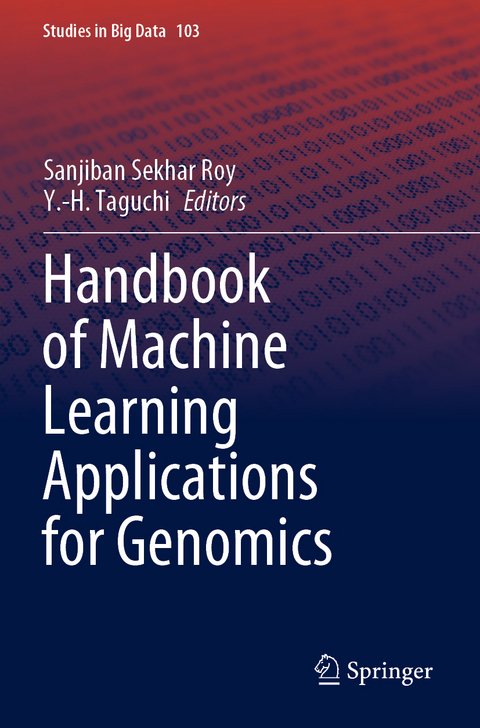
Handbook of Machine Learning Applications for Genomics
Springer Verlag, Singapore
978-981-16-9160-7 (ISBN)
Currently, machine learning is playing a pivotal role in the progress of genomics. The applications of machine learning are helping all to understand the emerging trends and the future scope of genomics. This book provides comprehensive coverage of machine learning applications such as DNN, CNN, and RNN, for predicting the sequence of DNA and RNA binding proteins, expression of the gene, and splicing control. In addition, the book addresses the effect of multiomics data analysis of cancers using tensor decomposition, machine learning techniques for protein engineering, CNN applications on genomics, challenges of long noncoding RNAs in human disease diagnosis, and how machine learning can be used as a tool to shape the future of medicine. More importantly, it gives a comparative analysis and validates the outcomes of machine learning methods on genomic data to the functional laboratory tests or by formal clinical assessment. The topics of this book will cater interest to academicians, practitioners working in the field of functional genomics, and machine learning. Also, this book shall guide comprehensively the graduate, postgraduates, and Ph.D. scholars working in these fields.
Sanjiban Sekhar Roy is an Associate Professor in the School of Computer Science and Engineering, Vellore Institute of Technology. He joined VIT in the year 2009 as an Asst. Professor. His research interests include Deep Learning and advanced machine learning. He has published around 50 articles in a reputed international journal (with SCI impact factors) and conferences. He also is editorial board members to a handful of international journals and reviewer to many highly reputed journals such as Neural processing letters, Springer , IEEE Access: The Multidisciplinary Open Access Journal, Computers & Security, Elsevier , International Journal of Advanced Intelligence Paradigms, Inderscience International publishers, International Journal of Artificial Intelligence and Soft Computing, Inderscience International publishers,Ad Hoc Networks, Elsevier, Evolutionary Intelligence, Springer, Journal of Ambient Intelligence and Humanized Computing, Springer, Iranian Journal of Science and Technology, Transactions of Electrical Engineering, Springer. He uses Deep Learning techniques to solve many complex engineering problems, especially those are related to imagery. He is specialized in deep convolutional neural networks. Dr. Roy also has edited many books with reputed interntional publishers such as elsevier,springer and IGI Global. Very recently, Ministry of National Education, Romania in collaboration with "Aurel Vlaicu" University Arad Faculty of Engineers, Romania has awarded Dr. Roy with "Diploma of Excellence" as a sign of appreciation for the special achievements obtained in the scientific research activity in 2019. Prof. Taguchi is currently a Professor at Department of Physics, Chuo University. Prof. Taguchi received a master degree in Statistical Physics from Tokyo Institute of Technology, Japan in 1986, and PhD degree in Non-linear Physics from Tokyo Institute of Technology, Tokyo, Japan in 1988. He workedat Tokyo Institute of Technology and Chuo University. He is with Chuo University (Tokyo, Japan) since 1997. He currently holds the Professor position at this university. His main research interests are in the area of Bioinformatics, especially, multi-omics data analysis using linear algebra. Dr. Taguchi has published a book on bioinformatics, more than 100 journal papers, book chapters and papers in conference proceedings.
Local and global characterization of genomic data.- DNA sequencing using RNN.- Deep learning to study functional activities of DNA sequence.- Autoencoders for gene clastering.- Dimension reduction in gene expression using deep learning.- To predict DNA methylation states using deep learning.- Transfer learning in genomics.- CNN model to analyze gene expression images.- Gene expression Prediction using advanced machine learning.- Predicting splicing regulation using deep learning.- Transcription factor binding site prediction using deep learning.- Deep learning for prediction of structural classification of proteins.- Prediction of secondary strucure of RNA using advanced machine learning and deep learning.- Deep learning for pepositioning of drug and pharmacogenomics.
| Erscheinungsdatum | 27.06.2023 |
|---|---|
| Reihe/Serie | Studies in Big Data |
| Zusatzinfo | 60 Illustrations, color; 15 Illustrations, black and white; X, 218 p. 75 illus., 60 illus. in color. |
| Verlagsort | Singapore |
| Sprache | englisch |
| Maße | 155 x 235 mm |
| Themenwelt | Mathematik / Informatik ► Informatik ► Datenbanken |
| Informatik ► Theorie / Studium ► Künstliche Intelligenz / Robotik | |
| Mathematik / Informatik ► Mathematik | |
| Naturwissenschaften ► Biologie ► Genetik / Molekularbiologie | |
| Technik | |
| Schlagworte | convolutional neural network • Deep learning • DNA Methylation • DNA sequencing • gene clastering • Gene expression Prediction • gene prediction • genomics • machine learning • Medical Diagnosis |
| ISBN-10 | 981-16-9160-6 / 9811691606 |
| ISBN-13 | 978-981-16-9160-7 / 9789811691607 |
| Zustand | Neuware |
| Haben Sie eine Frage zum Produkt? |
aus dem Bereich


